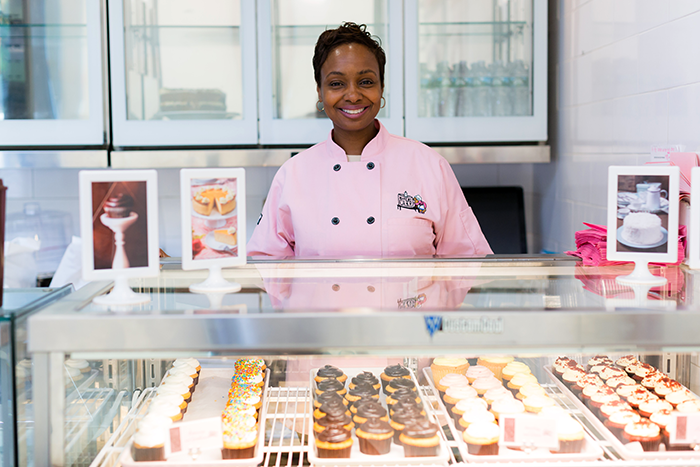
This article is part of Chase’s 2018 #SavingIt movement, where we are encouraging people to save money to help them reach their goals.
Like many entrepreneurs, Aliyyah Baylor knows how to do every job in her business. She’s the owner of a small bakery chain called Make My Cake, which produces custom-made sweets. Baylor often has to step in as the company’s baker, driver, customer relations specialist, and chief dreamer.
Make My Cake currently has two locations, is opening a third Manhattan storefront at the end of the summer, and has plans for a new bakery in the trendy neighboring borough of Brooklyn in the near future. As she meticulously decorated a two-foot square white layer cake with swirls of purple lettering in her decorators’ workroom recently, Baylor, who is 49 years old, explains how she grew her business out of a single kitchen to multiple storefronts, and the lessons she learned along the way.
How did Make My Cake come about?
Make My Cake was started by my mom, who made cakes out of our fifth-floor walk-up apartment in the Bronx. When she decided to go into corporate life, there was no one else who could replace her. I was home from college for summer break and the business fell into my lap.
I knew that if I was going to take the business further, working from home was not going to cut it. Corporate clients want to know that they were dealing with an established firm. Now, the majority of our business comes from corporate clients.
How did you handle financing?
I had saved a lot of money working in my mom’s business. If I earned $500 from making cakes, I’d put $400 of that in my rainy day fund and spend the rest on the ingredients for cakes. If you want to be an entrepreneur, you have to develop the habit and mindset of saving. Ask yourself: do I really need that new smartphone?
When we needed capital to open a storefront, which required equipment and construction work, I raised some money from my family, took short-term investments from a few friends, and I was able to obtain a startup loan from the Small Business Administration (SBA).
How difficult was that process?
It took nearly a year. I had to completely redo my business plan a couple of times. The SBA helped me understand that I had set my sights too low – I was estimating projected earnings based on what we were doing at home instead of the increase in business that would happen after we opened a store. They also helped me understand that some of what I was planning to do would not physically work in the size of the store we had leased.
Is there an advantage to having more corporate clients than retail sales?
Our business has a balance of wholesale, corporate and walk-in clients. Our large accounts allow us to have a consistent business and control inventory and purchasing. I can set quarterly projections and take orders without overbooking. We don’t have the manpower to do more right now, but our upcoming expansion will create other avenues for revenue like mail order. And our walk-in business will increase with more offerings for our clients purchasing last minute.
Speaking of manpower, how do you motivate employees?
We have 12 full-time workers plus interns we have sourced from local schools. I share my expectations with every team member. My goal is to make our employees into “intra-preneuers,” meaning a person who is growing with the success of the company they are working for.
I want to create an environment where everyone feels empowered and accountable through training and open book management. We also have an employee credo I call the Five Cs: caring, critical thinking, confidence, communications, and customer service.
What are your tips for entrepreneurs starting out?
You need someone on your team who knows your finances inside out. For me, that’s my bookkeeper. And you need business software that is simple to use and can provide key information at your fingertips.
One of the greatest mistakes any business owner can make is to look at the money they take in as money they can spend. You need to have a plan and stick to it. I check my numbers every day without fail. I tell my managers that I expect them to beat today’s numbers tomorrow. Every single day we should be growing the business.